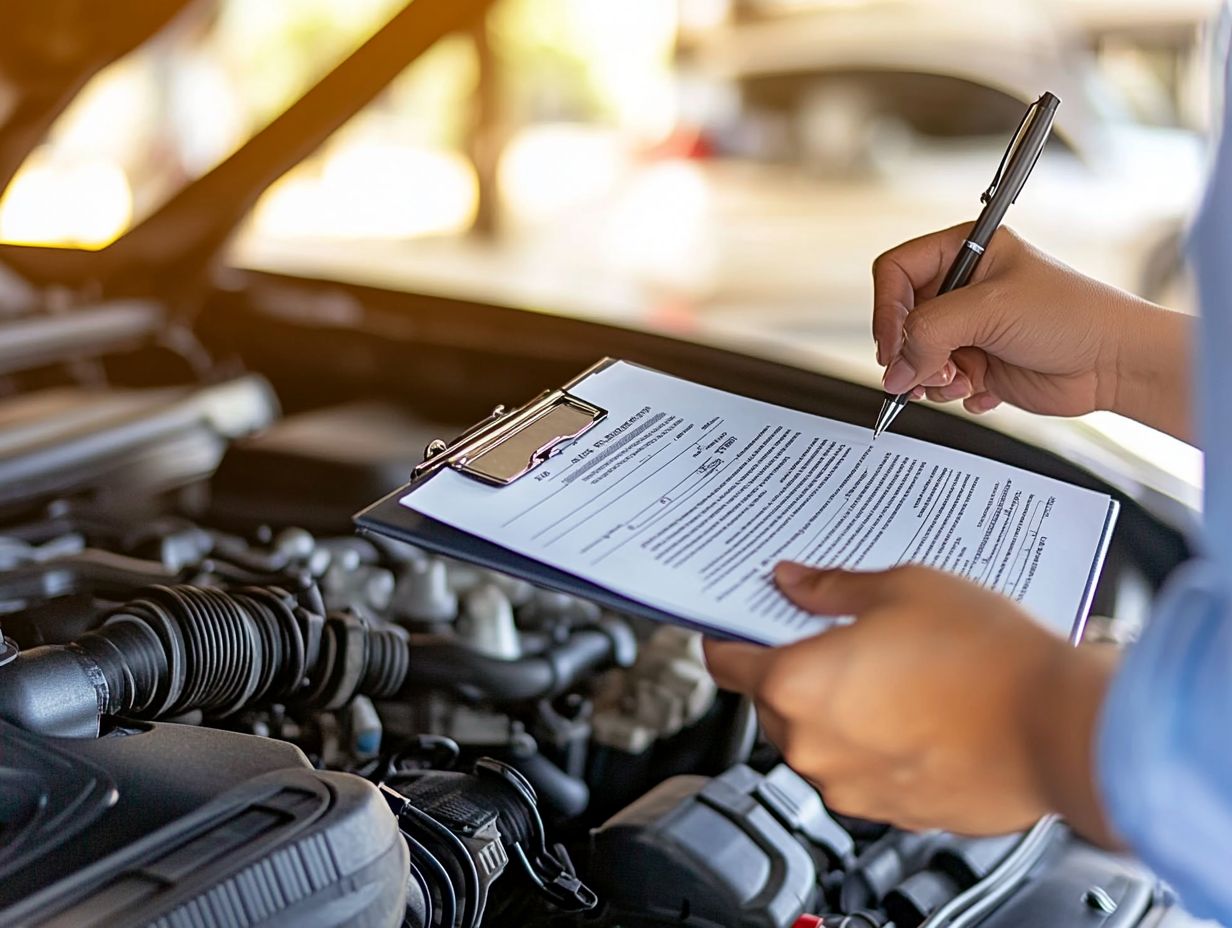5 Things to Know About Car Warranties Before Buying
Ready to protect your car and wallet? Navigating the realm of car warranties can feel daunting, especially with the plethora of options and terminology at your disposal.
Whether you re a first-time buyer or a seasoned car aficionado, knowing the details of car warranties is vital for safeguarding your investment.
This article will take you through the various types of car warranties available, what they encompass, their potential limitations, and strategies for negotiating the best deal.
By the conclusion, you’ll be equipped with the insights needed to make informed choices regarding your vehicle’s coverage.
Contents
- Key Takeaways:
- 1. Types of Car Warranties
- 2. Coverage and Limitations
- 3. Transferability and Cancellation
- 4. Cost and Negotiation
- 5. Importance of Reading the Fine Print
- What Is a Car Warranty and Why Is It Important?
- What Are the Different Types of Car Warranties Available?
- What Does a Car Warranty Typically Cover?
- What Are the Limitations of a Car Warranty?
- Can a Car Warranty Be Transferred to a New Owner?
- What Are the Factors That Affect the Cost of a Car Warranty?
- How Can One Negotiate the Terms of a Car Warranty?
- What Are the Common Exclusions in a Car Warranty?
- How Can One Avoid Voiding Their Car Warranty?
- What Are the Alternatives to a Car Warranty?
- What Are the Steps to Take When Filing a Claim Under a Car Warranty?
- Frequently Asked Questions
Key Takeaways:
- Understand the different types of car warranties before making a purchase.
- Be aware of the coverage and limitations of a car warranty to ensure proper protection.
- Know the transferability and cancellation policies for potential future changes in ownership.

1. Types of Car Warranties
Know the different types of car warranties to select the right coverage for your used vehicle, protecting you against unexpected repairs and associated costs. For those considering a new vehicle, exploring tips for first-time new car buyers can also be beneficial.
Manufacturer warranties cover defects in materials and workmanship, offering you peace of mind for a specified duration or mileage, usually ranging from three to five years. In contrast, used car warranties cater to older vehicles and often vary in coverage scope and duration.
Extended warranties can effectively bridge gaps in coverage, protecting you from issues like electrical system failures or transmission problems. Third-party providers often present more flexible plans that can be transferred among vehicle owners.
Prominent providers such as AA Auto Protection or Warranty Direct offer a spectrum of plans, from basic coverage for essential components like the engine and transmission to comprehensive coverage that includes almost all parts of the vehicle. This variety gives you the power to make informed decisions tailored to your specific needs and budget.
2. Coverage and Limitations
Understanding the coverage and limitations of your car warranty is essential for anticipating potential repairs and avoiding unexpected repair costs due to warranty exclusions.
A warranty typically covers mechanical issues, protecting vital components like the engine, transmission, and electrical systems. Some specific parts, such as brakes, air conditioning, and even certain entertainment features, might also be included, but you’ll want to scrutinize the details closely.
Be aware of common exclusions; for instance, damage caused by negligence or unforeseen circumstances can leave you vulnerable. In states like Connecticut, Massachusetts, and New York, lemon laws can significantly impact such warranties, providing you with recourse if your vehicle repeatedly fails to meet standards, which might alter what is covered under your warranty agreement.
3. Transferability and Cancellation
The transferability and cancellation provisions of a car warranty are essential considerations, especially if you envision selling your vehicle in the future. These factors can significantly influence warranty claims and impact the vehicle’s reliability rating.
Understanding how a warranty can be transferred to a new owner is crucial for anyone contemplating both the purchase and resale of a vehicle. A transferable warranty not only enhances the car’s value but also offers reassurance to prospective buyers, knowing they ll be covered for repairs after the purchase.
Moreover, you should meticulously review cancellation policies; many warranties come with specific terms outlining how and when you can cancel, along with any applicable fees. When you understand these details, you can make savvy decisions that cater to both your immediate needs and your long-term investment.
Let s dive in so you can choose the best warranty for your car!
4. Cost and Negotiation
The cost of a car warranty can fluctuate dramatically depending on various factors such as coverage plans, the model year of your vehicle, and the average annual repair costs. This variability highlights the need to negotiate for the best deal.
As you consider your options, think about how your auto loan impacts your overall budget for warranty expenses. Monthly payments can considerably affect your financial flexibility, so it’s essential to keep this in mind.
Explore factors like dealer pricing, the warranty’s duration, and the specific terms that may apply each of these elements can significantly influence the final cost.
Engaging in discussions with the dealership or third-party warranty providers can give you leverage for more favorable pricing.
By understanding the nuances of vehicle reliability and potential repair costs, you can empower yourself to make informed decisions tailored to your unique needs.
5. Importance of Reading the Fine Print
Reading the fine print of a car warranty is essential for grasping its details, limitations, and any exclusions that could impact your ability to seek repairs under the agreement.
These documents often lay out specific conditions that must be met for the warranty to remain valid, which may include sticking to prescribed service intervals and using approved parts. You’ll find crucial information regarding warranty exclusions, covering common scenarios like modifications or using unauthorized aftermarket parts that could jeopardize your coverage.
It’s vital to understand what counts as proper automotive service; neglecting regular maintenance, for instance, not only hampers your vehicle’s performance but could also result in unexpected expenses if the warranty becomes void.
Taking the time to carefully read every detail is crucial for making informed decisions that protect your warranty rights and the integrity of your vehicle.
What Is a Car Warranty and Why Is It Important?

A car warranty is a crucial safeguard for you as a vehicle owner, especially if you re driving a used car. It shields you from surprise repair costs that can hit hard when you least expect it, offering you peace of mind through detailed warranty plans tailored to your unique needs.
This coverage is essential not only for protecting your investment but also for ensuring your vehicle s long-term reliability. It typically covers repairs related to the engine, transmission, and other vital components issues that can hit your wallet hard if they arise unexpectedly.
By understanding the nuances of different warranty options, you can empower yourself to choose the policy that best fits your driving habits and anticipated vehicle usage. This knowledge gives you confidence in your vehicle’s dependability, knowing that you ve significantly reduced the risk of financial setbacks due to mechanical failures.
What Are the Different Types of Car Warranties Available?
There are various types of car warranties available to you, including manufacturer warranties, used car warranties, and third-party warranties. Each option offers different levels of coverage and protection, tailored for your unique needs as a vehicle owner.
Understanding these distinctions can greatly enhance your peace of mind and overall experience with your vehicle. Manufacturer warranties, typically included with new cars, often provide comprehensive coverage for a specific period usually ranging from three to five years or a set mileage limit. In contrast, used car warranties can vary significantly in terms of what they cover and their duration, often depending on the vehicle’s make and model.
Third-party warranties offer you flexible options, allowing you to customize your coverage to fit your personal requirements. Providers like CarShield, Endurance, and Protect My Car each present unique offerings that cater to different segments, including powertrain protection (coverage for critical components like the engine and transmission), roadside assistance, and additional perks. This gives you the freedom to tailor your warranty plans to suit your preferences perfectly.
What Does a Car Warranty Typically Cover?
A car warranty covers various components crucial for your vehicle s performance. It includes essential parts, repairs at authorized facilities, and may even offer bumper-to-bumper coverage for peace of mind.
Basic coverage focuses on key components like the engine, transmission, and brakes. More comprehensive policies extend to electrical systems, air conditioning, and hybrid systems.
If your power steering pump fails, basic coverage might only cover steering repairs. A comprehensive warranty, however, would address those repairs along with any electronic issues.
When facing costly repairs like a malfunctioning transmission, comprehensive coverage eases your worries. It protects you from unexpected expenses that can strain your budget.
What Are the Limitations of a Car Warranty?
Car warranties may come with limitations, including specific exclusions that can affect your claims during a breakdown. Understand these limitations as a vehicle owner.
Some repairs, like those for wear-and-tear items such as brake pads and tires, typically aren t covered. Be prepared to handle these expenses yourself.
Claims related to damage from accidents, misuse, or modifications usually aren t honored. It s crucial to read the fine print and clarify uncertainties with your warranty provider.
Being well-informed can save you money and provide the peace of mind you deserve.
Can a Car Warranty Be Transferred to a New Owner?
A car warranty can often be transferred to the new owner, adding value to your purchase. This enhances your coverage options.
To complete the transfer, you ll need to notify the warranty issuer and submit documents confirming the change of ownership. There may be a small fee to finalize the transfer.
Facilitating this process boosts the resale value of your vehicle and makes it more appealing to potential buyers.
What Are the Factors That Affect the Cost of a Car Warranty?
Several factors influence the cost of a car warranty. These include your vehicle’s model year, the types of coverage plans you choose, and current market trends.
The age of your vehicle and its current mileage also significantly impact pricing. Older vehicles often incur higher warranty costs, and high mileage can lead to added fees.
Carefully evaluate the features of the coverage plans, such as roadside assistance and parts replacement options. Assess these factors to balance benefits against costs for an informed decision.
How Can One Negotiate the Terms of a Car Warranty?

Negotiating the terms of a car warranty can open the door to better coverage options, more favorable details, and ultimately, a more satisfying experience with warranty providers.
By equipping yourself with knowledge about current market rates, you can approach negotiations with confidence and clarity. It’s not merely about the price; understanding the full range of warranty services available gives you the power to make informed choices.
Leveraging offers from competing warranty providers gives you an edge in discussions. This strategic advantage allows you to negotiate for benefits like lower deductibles or extended service periods. An informed negotiator knows precisely what to ask for, ensuring that all key aspects of coverage, including exclusions and limits, receive the attention they deserve.
What Are the Common Exclusions in a Car Warranty?
Common exclusions in a car warranty can significantly affect your repair costs and the reliability ratings of your vehicle. It s crucial for you to understand what isn t covered under your warranty.
Typically, exclusions include wear-and-tear items such as brake pads, tires, and batteries. These components naturally deteriorate over time and are considered normal maintenance, not defects.
Many warranties don t cover issues from pre-existing conditions. If your vehicle showed signs of trouble before the warranty kicked in, those issues might not be addressed.
Exclusions related to as-is sales can also come into play. If you purchased a car without any guarantees, you might find yourself footing the bill for costly repairs that would usually be covered under warranty.
By understanding these exclusions, you can save yourself from unexpected expenses in the future.
How Can One Avoid Voiding Their Car Warranty?
Avoiding the pitfalls that could void your car warranty is crucial for maintaining that essential coverage. It s important to understand warranty exclusions and adhere to the prescribed car service guidelines.
By implementing a few practical strategies, you can ensure your warranty remains intact. Scheduling regular maintenance checks at recommended intervals is not just a suggestion; it s vital as it showcases your commitment to responsible vehicle care.
Choosing authorized repair facilities is a smart move, ensuring you achieve quality repairs while safeguarding your warranty. Be cautious about modifications or parts made by other manufacturers that could jeopardize your coverage always consult the warranty guidelines before making any changes.
Learn about common warranty pitfalls to avoid big headaches later.
What Are the Alternatives to a Car Warranty?
Several compelling alternatives to traditional car warranties await your consideration, including vehicle service contracts, third-party warranties, and comprehensive auto insurance policies. Each option offers varying levels of protection tailored to your specific needs.
These alternatives come with their own set of advantages and drawbacks, impacting not just the extent of coverage but also your overall expenditure. Vehicle service contracts can often be customized to suit particular vehicles and mileage, providing you with tailored protection. However, brace yourself for the possibility of significant out-of-pocket expenses.
On the other hand, third-party warranties may entice you with lower upfront costs, but they often fall short in delivering comprehensive coverage and can lead to convoluted claims processes.
In contrast, comprehensive auto insurance policies typically cover a wide array of incidents, from theft to accidents. Yet, they may not address mechanical failures in the same thorough manner as a traditional warranty.
To navigate these alternatives effectively, you’ll need to weigh your personal circumstances and financial implications with care.
What Are the Steps to Take When Filing a Claim Under a Car Warranty?
Filing a claim under your car warranty involves several essential steps that you ll want to approach methodically. Start by reaching out to your warranty provider and gathering the necessary documentation, including service records and proof of purchase. This information is critical to substantiating your claim.
Take the time to thoroughly review the warranty terms. Understanding what is covered can save you a significant amount of frustration. Once you’re prepared, effective communication with the warranty provider becomes paramount; clarity and conciseness can help you avoid any misunderstandings.
Next, identify an authorized repair facility. Before any work begins, discuss the issue with them. This smart move speeds up your approval process and gets you back on the road faster!
Frequently Asked Questions
What are car warranties?

Car warranties are a kind of coverage you buy when purchasing a new or used car. They cover the cost of certain repairs or replacements within a specific time frame or mileage limit.
Why is it important to know about car warranties before buying?
Knowing about car warranties before buying helps you understand the coverage and limitations of your warranty. This knowledge can potentially save you money on car warranties in the long run.
What are the different types of car warranties?
There are three main types of car warranties: bumper-to-bumper, powertrain, and extended warranties. Bumper-to-bumper warranties cover most components of the car, while powertrain warranties cover the engine, transmission, and parts that deliver power to the wheels. Extended warranties can be purchased for additional coverage.
What should I look for in a car warranty?
When looking at car warranties, check the coverage length, components included, deductibles, and refer to what to look for in the fine print regarding the warranty provider’s reputation.
Do I have to buy a car warranty from the dealership?
No, you are not required to buy a car warranty from the dealership. You can purchase a warranty from a third-party provider. Make sure to do your research and read reviews before making a decision.
Can I negotiate the price of a car warranty?
Yes, you can negotiate the price of a car warranty. Just like negotiating the price of a car, you can also negotiate the price and terms of a warranty with the dealership or third-party provider.





